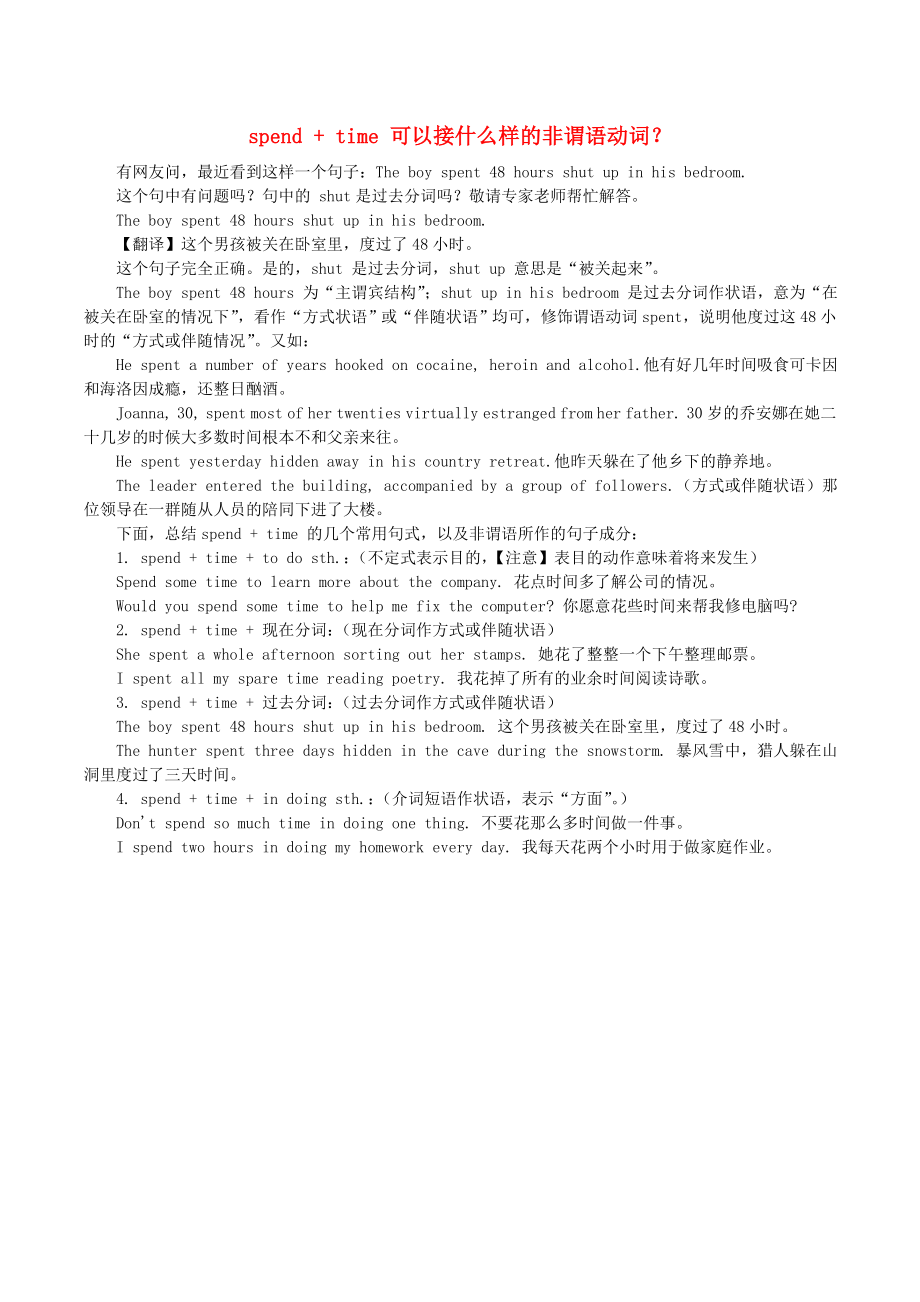《2015年高中英語(yǔ)疑難探究 spend time 可以接什么樣的非謂語(yǔ)動(dòng)詞���?素材》由會(huì)員分享�,可在線閱讀���,更多相關(guān)《2015年高中英語(yǔ)疑難探究 spend time 可以接什么樣的非謂語(yǔ)動(dòng)詞��?素材(1頁(yè)珍藏版)》請(qǐng)?jiān)谘b配圖網(wǎng)上搜索���。
1、spend + time 可以接什么樣的非謂語(yǔ)動(dòng)詞���?
有網(wǎng)友問(wèn)����,最近看到這樣一個(gè)句子:The boy spent 48 hours shut up in his bedroom.?
這個(gè)句中有問(wèn)題嗎�����?句中的 shut是過(guò)去分詞嗎��?敬請(qǐng)專家老師幫忙解答���。
The boy spent 48 hours shut up in his bedroom.
【翻譯】這個(gè)男孩被關(guān)在臥室里��,度過(guò)了48小時(shí)���。
這個(gè)句子完全正確�����。是的�����,shut 是過(guò)去分詞����,shut up 意思是“被關(guān)起來(lái)”����。
The boy spent 48 hours 為“主謂賓結(jié)構(gòu)”;shut up in his bedroom
2�����、 是過(guò)去分詞作狀語(yǔ)�����,意為“在被關(guān)在臥室的情況下”,看作“方式狀語(yǔ)”或“伴隨狀語(yǔ)”均可����,修飾謂語(yǔ)動(dòng)詞spent��,說(shuō)明他度過(guò)這48小時(shí)的“方式或伴隨情況”����。又如:
He spent a number of years hooked on cocaine, heroin and alcohol.他有好幾年時(shí)間吸食可卡因和海洛因成癮,還整日酗酒�����。
Joanna, 30, spent most of her twenties virtually estranged from her father. 30歲的喬安娜在她二十幾歲的時(shí)候大多數(shù)時(shí)間根本不和父親來(lái)往�。
He spent yesterday
3、hidden away in his country retreat.他昨天躲在了他鄉(xiāng)下的靜養(yǎng)地��。
The leader entered the building, accompanied by a group of followers.(方式或伴隨狀語(yǔ))那位領(lǐng)導(dǎo)在一群隨從人員的陪同下進(jìn)了大樓�。
下面,總結(jié)spend + time 的幾個(gè)常用句式�����,以及非謂語(yǔ)所作的句子成分:
1. spend + time + to do sth.:(不定式表示目的����,【注意】表目的動(dòng)作意味著將來(lái)發(fā)生)
Spend some time to learn more about the company. 花點(diǎn)
4��、時(shí)間多了解公司的情況����。
Would you spend some time to help me fix the computer? 你愿意花些時(shí)間來(lái)幫我修電腦嗎?
2. spend + time + 現(xiàn)在分詞:(現(xiàn)在分詞作方式或伴隨狀語(yǔ))
She spent a whole afternoon sorting out her stamps. 她花了整整一個(gè)下午整理郵票���。
I spent all my spare time reading poetry. 我花掉了所有的業(yè)余時(shí)間閱讀詩(shī)歌���。
3. spend + time + 過(guò)去分詞:(過(guò)去分詞作方式或伴隨狀語(yǔ))
The boy s
5、pent 48 hours shut up in his bedroom. 這個(gè)男孩被關(guān)在臥室里��,度過(guò)了48小時(shí)���。
The hunter spent three days hidden in the cave during the snowstorm. 暴風(fēng)雪中�,獵人躲在山洞里度過(guò)了三天時(shí)間�。
4. spend + time + in doing sth.:(介詞短語(yǔ)作狀語(yǔ),表示“方面”�����。)
Don't spend so much time in doing one thing. 不要花那么多時(shí)間做一件事。
I spend two hours in doing my homework every day. 我每天花兩個(gè)小時(shí)用于做家庭作業(yè)���。
 2015年高中英語(yǔ)疑難探究 spend time 可以接什么樣的非謂語(yǔ)動(dòng)詞?素材
2015年高中英語(yǔ)疑難探究 spend time 可以接什么樣的非謂語(yǔ)動(dòng)詞?素材
